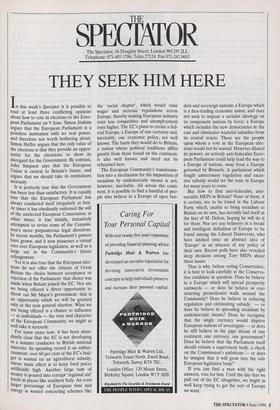SPECTATOR
The Spectator, 56 Doughty Street, London WC1N 2LL Telephone: 071-405 1706; Telex 27124; Fax 071-242 0603
THEY SEEK HIM HERE
It is perfectly true that the Government has been less than satisfactory. It is equally true that the European Parliament has always conducted itself irregularly at best. At times it has obediently endorsed the will of the unelected European Commission; at other times, it has timidly, tentatively attempted to revise some of the Commis- sion's more preposterous legal directives. In recent months, the Parliament's powers have grown, and it now possesses a virtual veto over European legislation, as well as a large say in the Community's future enlargement.
Yet it is also true that the European elec- tions do not offer the citizens of Great Britain the choice between acceptance or rejection of the Parliament: that choice was made when Britain joined the EC. Nor are we being offered a direct opportunity to throw out Mr Major's government: that is an opportunity which we will be granted only at the next general election. What we are being offered is a chance to influence — as individuals — the tone and character of the European Community; we might as well take it seriously.
For some years now, it has been abun- dantly clear that the EC is not developing in a manner conducive to British national interests. Its spending record is an embar- rassment: over 60 per cent of the EC's bud- get is wasted on an agricultural subsidy, whose main effect is to keep food prices artificially high. Another large sum of money is poured into corrupt 'regional aid' funds in places like southern Italy. An even larger percentage of European time and energy is wasted concocting schemes like
the 'social chapter', which would raise wages and increase regulations across Europe, thereby making European industry even less competitive and unemployment even higher. The EC's plans to create a fed- eral Europe, a Europe of one currency and, inevitably, one economic policy, are well known. The harm they would do to Britain, a nation whose political traditions differ greatly from those found on the continent, is also well known and need not be rehearsed here.
The European Community's transforma- tion into a mechanism for the imposition of socialism by undemocratic means is not, however, inevitable. All across the conti- nent, it is possible to find a handful of peo- ple who believe in a Europe of open bor- ders and sovereign nations; a Europe which is a free-trading economic union, and does not seek to impose a socialist ideology on its component nations by force; a Europe which includes the new democracies in the east and eliminates wasteful subsidies from its central tenets. These are the people upon whom a vote in the European elec- tions would not be wasted. However diluted its powers, an actively anti-federalist Euro- pean Parliament could help lead the way to a Europe of nations, away from a Europe governed by Brussels. A parliament which fought unnecessary regulation and exces- sive subsidy would set the tone in Europe for many years to come.
But how to find anti-federalist, anti- socialist MEPs in Britain? None of them, it is certain, are to be found in the Labour Party, which, unable to bring socialism to Britain on its own, has slavishly laid itself at the feet of M. Delors, hoping he will do it for them. Nor are any believers in a broad and intelligent definition of Europe to be found among the Liberal Democrats, who have latched onto an abstract idea of `Europe' in an absence of any policy of their own. Recent polls have also revealed deep divisions among Tory MEPs about these issues.
That is why, before voting Conservative, it is best to look carefully at the Conserva- tive candidate in question. Does he believe in a Europe which will spread prosperity eastwards — or does he believe in con- structing protectionist walls around the Community? Does he believe in reducing regulation and eliminating subsidy — or does he believe in spreading socialism by undemocratic means? Does he recognise that the single currency would deprive European nations of sovereignty — or does he still believe in the pipe dream of one continent, one currency, one government? Does he believe that the Parliament itself should remain a supervisory body, a check on the Commission's ambitions — or does he imagine that it will grow into the sole European legislative body?
If you can find a man with the right answers, vote for him. Until the day that we pull out of the EC altogether, we might as well keep trying to get the sort of Europe we want.


























































 Previous page
Previous page